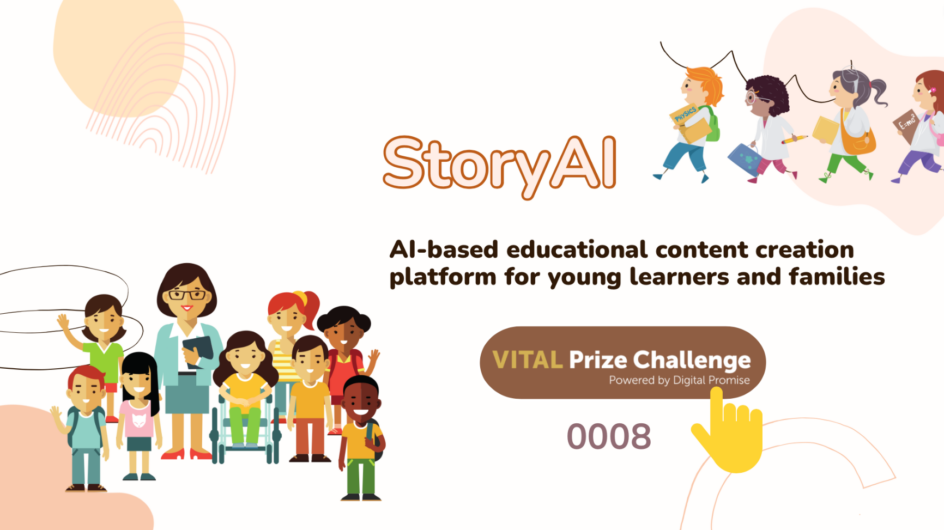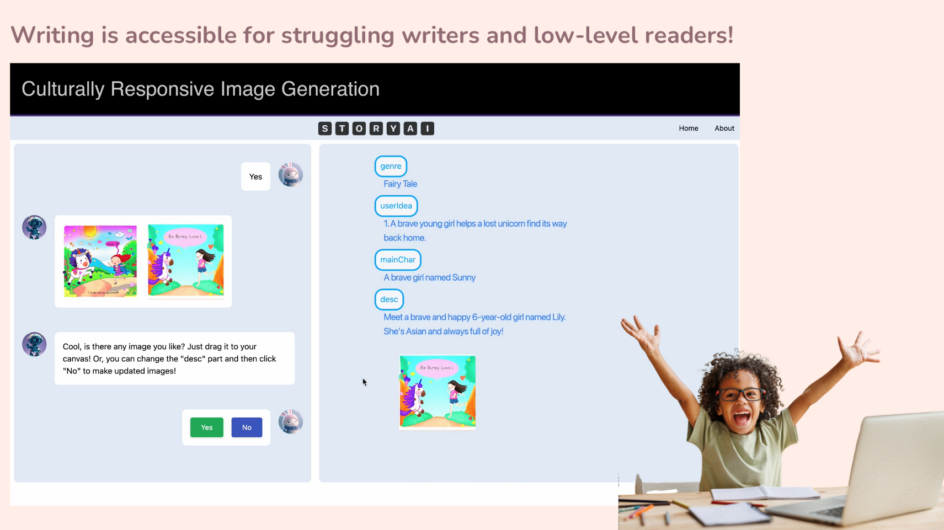Advancing StoryAI: The VITAL Prize Challenge
After advancing to the semi-final round of the NSF VITAL Prize Challenge in July, Informatics Ph.D. student Ariel Han continues to expand StoryAI, an AI-based learning platform.
In July 2023, the National Science Foundation (NSF) announced the 54 projects advancing to the semi-final round of its Visionary Interdisciplinary Teams Advancing Learning (VITAL) Prize Challenge. Among the projects selected was StoryAI, a culturally responsive learning platform that uses generative AI to engage students in writing and storytelling.

Informatics Ph.D. student Ariel Han of UC Irvine’s Donald Bren School of Information and Computer Sciences (ICS), who is leading the project, has spent the last few months working with teammates to enhance the StoryAI prototype.
“StoryAI is a fascinating project that aims to support personalized learning at scale using generative AI methodologies,” says Han. She is collaborating with her Ph.D. advisor, Informatics Professor Kylie Peppler; fellow UCI Ph.D. students Shenshen Han (informatics) and Zhenyao Cai (education); and ICS research scientist Seth Corrigan. With funding through VITAL and support from VITAL Prize mentor Gayle Kolodny Cole, the team submitted a minimum viable StoryAI prototype on Oct. 16, 2023, which includes three different demos: creative writing, argumentative writing, and an interactive storytelling game.
StoryAI: Improving Writing Skills
StoryAI aims to help decenter English-only practices by better engaging parents fluent in other languages.
“I was called by my daughter’s teacher, and the teacher said Emily needs extra help in English,” reads the opening slide for the team’s StoryAI presentation. “I don’t know how to help her since we’re not fluent in English.”
StoryAI is an educational content creation platform for young learners that can also involve family members. It is designed to better engage English language learners, racial minorities and low-socioeconomic status (SES) households, and students with disabilities.
Such engagement is critical as the U.S. deals with an ongoing literacy crisis that has only worsened after the pandemic. Average reading scores for fourth and eighth graders are declining, and 43 million American adults have low literacy skills.
StoryAI helps students with narrative writing, argumentative writing, interactive storytelling, using playful literacy activities and culturally responsive text. It helps build foundational writing skills using an inclusive design that includes text translation, text-to-speech software and visual reading aids.

Preliminary pilot studies with the platform suggest it reduces anxiety about the writing process, enhances reading comprehension, improves writing skills and increases student confidence in their writing abilities.
Next Steps
The submitted prototype builds on ideas the team piloted last year, exploring how to leverage ChatGPT and AI art generators to enhance literacy and storytelling skills in an inclusive environment. Han collaborated with CreativityLabs researchers and Santa Ana libraries on that work (which was first submitted to the VITAL Challenge in February as AIStory and later selected as one of 100 teams to compete).
As Han progresses with her dissertation research (thanks to the NSF funding as well as a Graduate Innovation Fellowship from UCI Beall Applied Innovation), she and her team plan to optimize the story formats, expand the curriculum and fine-tune the AI models. The team also hopes to create a “share” feature for students and an interface for teachers that supports lesson planning.
“VITAL provided us with the opportunity to incorporate marginalized learners into the design considerations of the platform on which we implemented various universal design components,” says Han. Moving forward, the team plans to “examine learning outputs and outcomes from field studies with students.”
In November, Han will learn whether AIStory will be one of 18 teams selected to advance to the final round of the VITAL Prize Challenge. Finalists will receive an additional $50,000 in funding and the chance to compete for the first-place prize of $250,000.
— Shani Murray